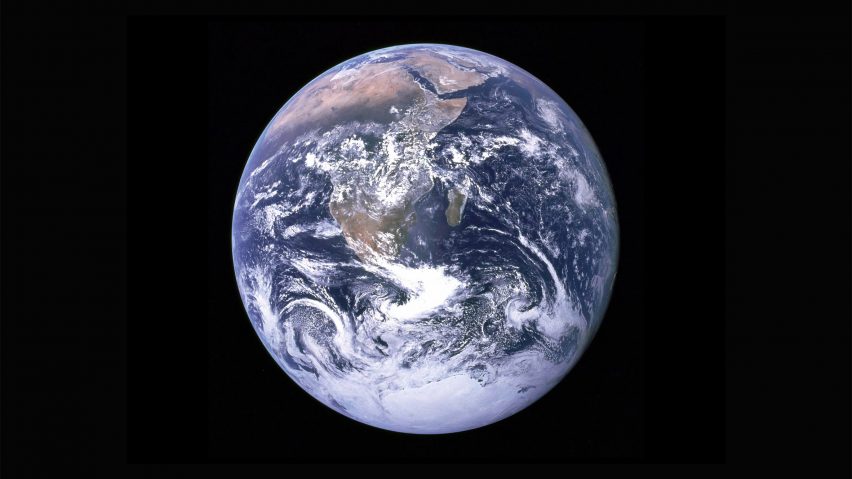To mark this year's Earth Day, Dezeen has selected 12 recent interviews that will make you more informed about the major environmental issues facing the planet.
Dezeen interviews numerous prominent figures from the world of design and architecture – often focusing on reducing emissions, cutting waste, protecting biodiversity or other topics linked to sustainability.
The interviews below feature broad range of conversations including discussions with Pritzker Architecture Prize-winners Diébédo Francis Kéré and Norman Foster, fashion designer Stella McCartney and ocean-plastic campaigner Cyrill Gutsch.
Here are 12 interviews with leading voices on sustainable design and architecture:
"We have to be careful not to condemn" in the face of the climate crisis says Diébédo Francis Kéré
Speaking to Dezeen, Burkinabe architect Diébédo Francis Kéré emphasised the importance of a balanced approach to designing less environmentally damaging buildings.
Kéré, who became the first African to win the Pritzker Architecture Prize in 2022, said he "will always use concrete where it's needed structurally", but is also quick to "grab" timber if it provides a potential solution.
Indigenous technologies "could change the way we design cities" says environmentalist Julia Watson
Julia Watson is a designer, educator and author who is an expert in the climate-resilient technologies long-used by indigenous and traditional communities around the world.
She spoke to Dezeen about how these "LO-TEK" solutions can help increase biodiversity, mitigate flooding, clean water and sequester carbon, and the limitations of high-tech approaches to dealing with climate change.
"There are a lot of dangerous myths" about sustainability says Norman Foster
Dezeen editor Tom Ravenscroft recently probed Norman Foster, founder of the UK's largest architecture studio Foster + Partners, about his views on concrete, timber, aviation and Architects Declare.
"I think that it's well-intentioned, but misplaced, and I think we have to have a more holistic, wider view of reducing imprints," Foster said of the intense scrutiny of his firm's work on airports.
"Mass-timber buildings can have very high carbon emissions" says Amy Leedham
As part of Dezeen's recent Timber Revolution series investigating the potential of mass timber, we spoke to Amy Leedham, carbon lead at engineering consultancy Atelier Ten.
She sounded the alarm over "oversimplification and glorification of mass timber" due to wood's ability to sequester carbon, which she warned is leading to "greenwashing".
Solar power's potential limited unless "you do everything perfectly" says solar scientist
In September 2022, Dezeen's Solar Revolution series focused on solar energy and how humans can best harness the power of the sun to end fossil-fuel dependence.
Speaking to Dezeen as part of the series, Dutch solar scientist Wim C Sinke said the embodied carbon impact of producing solar panels is holding the technology back, and called for the industry to embrace circular principles.
Sustainable architecture efforts hindered by "sloppiness" says UN climate ambassador
On the final day of the COP27 climate conference, Dezeen spoke to Egyptian architect and UN Race to Zero ambassador Sarah El Battouty, who hit out at the architecture profession's lack of accountability over decarbonisation.
"For years and years, we've had everyone create a silly building design and then stick a couple of solar panels on top and call it a green building," she said. "This kind of sloppiness was allowed all the time."
"We don't have the power to stop our extinction" says Paola Antonelli
Back in 2019, MoMA architecture and design curator Paola Antonelli made startling comments in a conversation with Dezeen, declaring that humans will inevitably go extinct due to environmental breakdown and so should start planning for the legacy of our species.
The interview accompanied a major exhibition in Milan curated by Antonelli that explored humankind's troubled relationship with the planet.
"We fooled ourselves that sustainability was getting us where we needed to go" says Michael Pawlyn
British architect Michael Pawlyn, who co-initiated the Architects Declare climate network, has long advocated for regenerative design that goes beyond simply reducing its negative impact on the planet and seeks to actively benefit the environment and biodiversity.
"There's something inherently problematic in the framing of sustainability that implies the best you can aspire to is neutrality, and anything less than that is just part of a degenerative downward cycle," he told Dezeen.
"Designers aren't taking responsibility" says Stella McCartney
British fashion designer Stella McCartney called for "new laws" to be imposed on designers to force them to take responsibility for the sustainability of their products.
She was speaking with Dezeen at the 2018 opening of the flagship London store for her eponymous label, which has experimented with alternative materials such as mycelium and bioplastic.
German-born designer Cyrill Gutsch is known for his pioneering use of ocean plastic, reinventing a waste stream as a luxury material through his company Parley for the Oceans.
But in an interview with Dezeen he revealed that he does not believe cleaning up the oceans is possible and that the focus must be on developing alternative materials to plastics.
Architects and designers "absolutely vital" in shift to circular economy says Ellen MacArthur
In this interview, former round-the-world sailor Ellen MacArthur spoke about the importance of designers' participation in efforts to transition to a circular economy.
Since retiring from yachting, MacArther has become one of the most high-profile champions of reducing industrial waste through her charity, the Ellen MacArthur Foundation.
Architects not adopting biomaterials are "dinosaurs" says Michael Green
With liberal use of colourful language, Canadian architect Michael Green shared his views on the relationship between materials and architectural styles as part of the Timber Revolution series.
"We're attached to this notion of modernism that steel, glass, and concrete, are modern," he said. "Fuck that. Those are archaic materials. Those are industrial-age materials."

